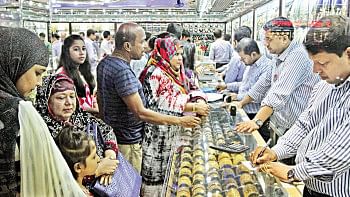Increase efforts to combat trafficking


Human trafficking and illegal migration cannot be solved by a single entity but those demand cumulative effort from all sectors. We will reach every victim and hold every perpetrator accountable.
Speakers at a national-level dialogue yesterday said although Bangladesh has made progress in combating human trafficking, the government needs to enhance its effort to reach every trafficking victim as multi-dimensional challenges still remain.
They said addressing root causes of human trafficking such as poverty, inequality and lack of education is essential. Besides, building awareness among communities and enhancing the capacity of investigators and prosecutors are prerequisites to fighting the heinous crime.
The home ministry with support of the Counter Trafficking in Persons Technical Working Group (CTIP-TWG) of Bangladesh UN Network on Migration organised the dialogue at a city hotel, observing World Day against Trafficking in Persons.
Home Minister Asaduzzaman Khan said Bangladesh will not tolerate human trafficking as the government has a "zero tolerance" policy to this end.
"We will reach every victim and hold every perpetrator accountable," he said, addressing the dialogue as chief guest.
However, human trafficking and illegal migration cannot be solved by a single entity but those demand cumulative effort from all sectors, the minister added.
Human trafficking is not an isolated issue but a symptom of deeper problems within the societies that thrives in the shadows of poverty, inequality and desperation.
According to the US state department's 2023 Trafficking in Persons Report, courts and tribunals in Bangladesh convicted 94 traffickers in 35 cases in the latest reporting period compared to the previous reporting period when courts convicted 18 traffickers in 11 cases.
Courts sentenced most traffickers to fines, with 33 traffickers receiving terms of imprisonment and 61 traffickers receiving penalties of fines only, the report says.
Although convictions increased, the imposition of fines rather than jail time weakened deterrence, undercut the government's overall anti-trafficking efforts, and likely created security and safety concerns, particularly for victims who cooperated with investigations and prosecutions, it adds.
Gwyn Lewis, UN resident coordinator in Bangladesh, at the dialogue said despite extensive efforts, trafficking in Bangladesh remains a challenge, stressing to address issues like sexual exploitation, domestic servitude, and forced labour which are linked to trafficking.
She said with the support of humanitarian and development partners, the UN continues to work with Bangladesh government to ensure that all survivors of trafficking have access to national protection services.
IOM Bangladesh Officer in Charge Fathima Nusrath Ghazzali said addressing trafficking in persons requires a comprehensive approach based on promotion and protection of human rights and fundamental freedom of all human beings.
"We need to redouble our outreach efforts and ensure support for every victim," she added.
Combating human trafficking requires a holistic approach by all stakeholders and integrated actions that goes on prevention, protection of victims, awareness raising, building evidence-based policies and especially enabling successful investigation and prosecution, said Marco Teixeira, regional representative of UNODC South Asia.
European Union Ambassador to Bangladesh Charles Whiteley said human trafficking is not an isolated issue but a symptom of deeper problems within the societies that thrive in the shadows of poverty, inequality and desperation.
He emphasised on the importance of collaborative effort and having robust legal framework to effectively combat human trafficking.
"Together we can create a powerful alliance that leaves traffickers with no safe haven," he added.
Foreign Secretary Masud Bin Momen said Bangladesh's "Tier-2" status for consecutive years in the US state department's TIP report testifies the effectiveness of the government's continuous efforts under the "zero tolerance" policy.
Bangladesh has long been working to build partnerships with international stakeholders to combat human trafficking, he said.
He also said as per experts, thousands of Rohingya people in Bangladesh refugee camps are at risk of trafficking, reiterating that their repatriation to Myanmar is the ultimate and sustainable solution to address their vulnerabilities.
Chaired by Senior Secretary Mustafizur Rahman of the public security division, the dialogue was also addressed by Additional Inspector General of Police Monirul Islam, among others.


 For all latest news, follow The Daily Star's Google News channel.
For all latest news, follow The Daily Star's Google News channel. 



Comments